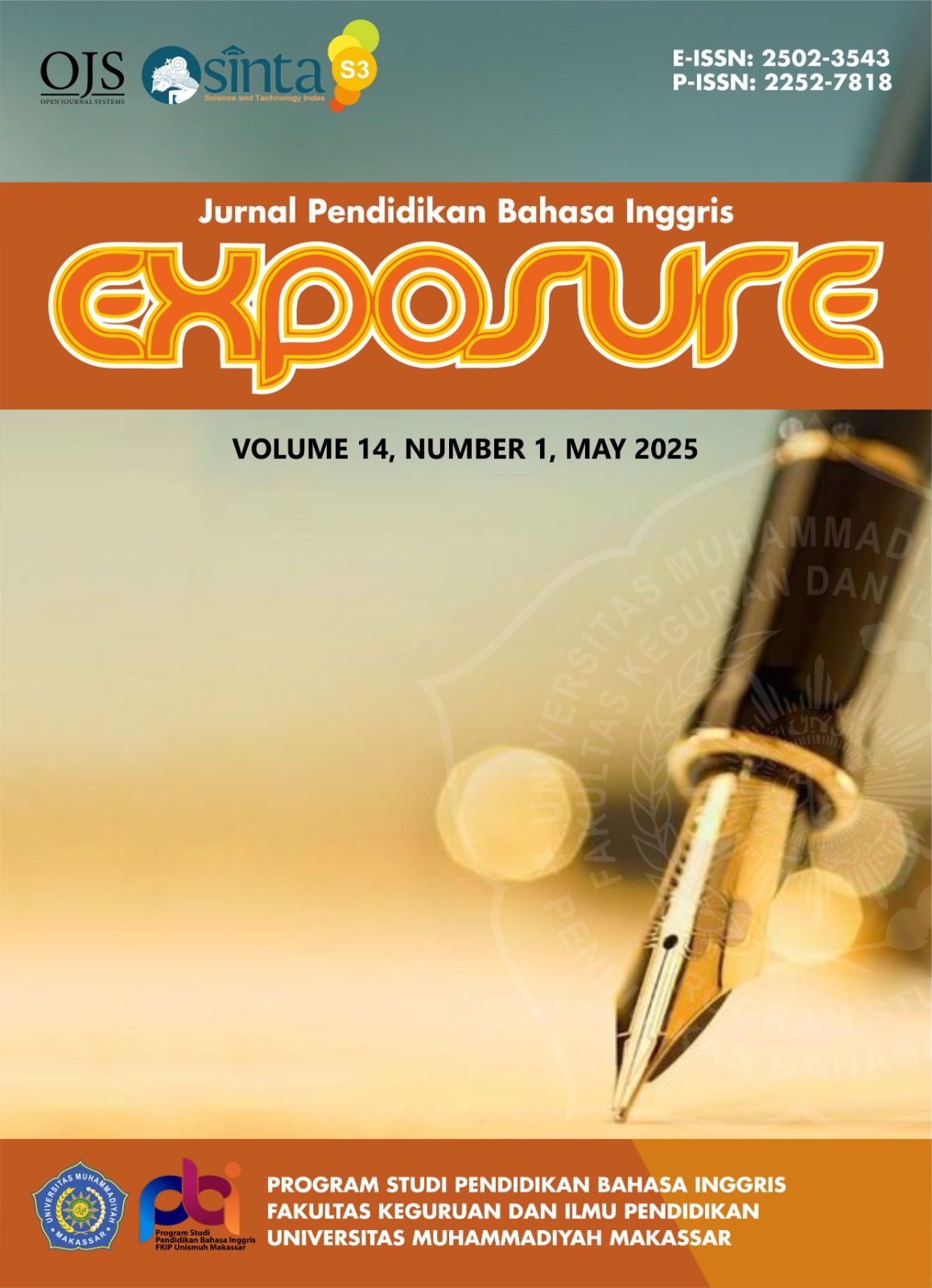INCREASING ENGLISH VOCABULARY OF GRADE VIII STUDENTS THROUGH WORD GAMES
DOI: https://doi.org/10.26618/exposure.v14i1.15477
English Vocabulary, Increasing, Word Games
Abstract
This research aims to find out whether or not the use of Word Games can effectively increase English vocabulary of grade VIII students at SMP Negeri 10 Palu. This research applied a quasi-experimental design that involved two classes, the experimental class and the control class. The sample of this research was the grade VIII students at SMP Negeri 10 Palu; VIII A consisted of 25 students as an experimental class and VIII B consisted of 25 students as a control class were selected by using simple random sampling. The data were collected through pretest and posttest. The data were analyzed by using SPSS application version 29. The result of the mean score in the experimental class on pretest is 53.44 and the control class is 50.08. The mean score of the posttest in the experimental class is 90.04 and the control class is 61.12. Independent samples t test showed that the significance is 0.000 and the standard significance is 0.05 which means that the value of significance is lower than the standard significance (0,000<0,05). It can be concluded that the use of Word Games can increase English vocabulary of the grade VIII students.
References
Abbas, M., & Fadhly, F. (2014). Applying Word Chain Game to Improve Students’ Vocabulary Mastery. ELT-Lectura, 1(1), 44–48. https://doi.org/10.31849/elt-lectura.v1i1.450
Amato, R. (1995). Making it happen: Interaction in the Second Language classroom: From Theory to Practice. New York: Longman.
Bintz, W. P. (2011). Teaching Vocabulary across the Curriculum. Middle School Journal, 42(4). https://doi.org/10.1080/00940771.2011.11461773
Eryilmaz, M. (2015). The Effectiveness Of Blended Learning Environments. Contemp. Issues Educ. Res, 8.
Leavy, P. (2017). Research Design. New York: The Guildford Press.
Rohaizat, N., & Aziz, A. A. (2022). Exploring the Challenges of Language Learning Strategies in Learning the English Language. International Journal of Academic Research in Business and Social Sciences.
Sabila, I., & Niswa, K. (2023). Using Scrabble Word Game to Improve Students’ Vocabulary Mastery. English Teaching and Linguistics Journal (ETLiJ), 4(1), 35–38. https://doi.org/10.30596/etlij.v4i1.13064
Terasne, T., Tawali, T., & Afriani, N. (2018). The Application of Word Association Game in Improving Students’ Vocabulary Mastery at Second Grade Student of Smpn 5 Pujut. JISIP (Jurnal Ilmu Sosial Dan Pendidikan), 2(1), 368–373. https://doi.org/10.58258/jisip.v2i1.600
Wahyudi, M. A., & Kusumahwardani, A. (2024). The Effectiveness of Word Search Puzzle Game as Media for Teaching Vocabulary. ELP (Journal of English Language Pedagogy), 9(1), 43–52. https://doi.org/10.36665/elp.v9i1.817
Downloads
Published
How to Cite
Issue
Section
License
Authors who publish with this journal agree to the following terms:
In order to assure the highest standards for published articles, a peer review policy is applied. In pursue of the compliance with academic standards, all parties involved in the publishing process (the authors, the editors and the editorial board and the reviewers) agree to meet the responsibilities stated below in accordance to the Journal publication ethics and malpractice statement.
Duties of Authors:
- The author(s) warrant that the submitted article is an original work, which has not been previously published, and that they have obtained an agreement from any co-author(s) prior to the manuscript’s submission;
- The author(s) should not submit articles describing essentially the same research to more than one journal;
- The authors(s) make certain that the manuscript meets the terms of the Manuscript Submission Guideline regarding appropriate academic citation and that no copyright infringement occurs;
- The authors(s) should inform the editors about any conflict of interests and report any errors they subsequently, discover in their manuscript.
Duties of Editors and the Editorial Board:
- The editors, together with the editorial board, are responsible for deciding upon the publication or rejection of the submitted manuscripts based only on their originality, significance, and relevance to the domains of the journal;
- The editors evaluate the manuscripts compliance with academic criteria, the domains of the journal and the guidelines;
- The editors must at all times respect the confidentiality of any information pertaining to the submitted manuscripts;
- The editors assign the review of each manuscript to two reviewers chosen according to their domains of expertise. The editors must take into account any conflict of interest reported by the authors and the reviewers.
- The editors must ensure that the comments and recommendations of the reviewers are sent to the author(s) in due time and that the manuscripts are returned to the editors, who take the final decision to publish them or not.
Authors are permitted and encouraged to post online a pre-publication manuscript (but not the Publisher’s final formatted PDF version of the Work) in institutional repositories or on their Websites prior to and during the submission process, as it can lead to productive exchanges, as well as earlier and greater citation of published work (see The Effect of Open Access). Any such posting made before acceptance and publication of the Work shall be updated upon publication to include a reference to the Publisher-assigned DOI (Digital Object Identifier) and a link to the online abstract for the final published Work in the Journal.














